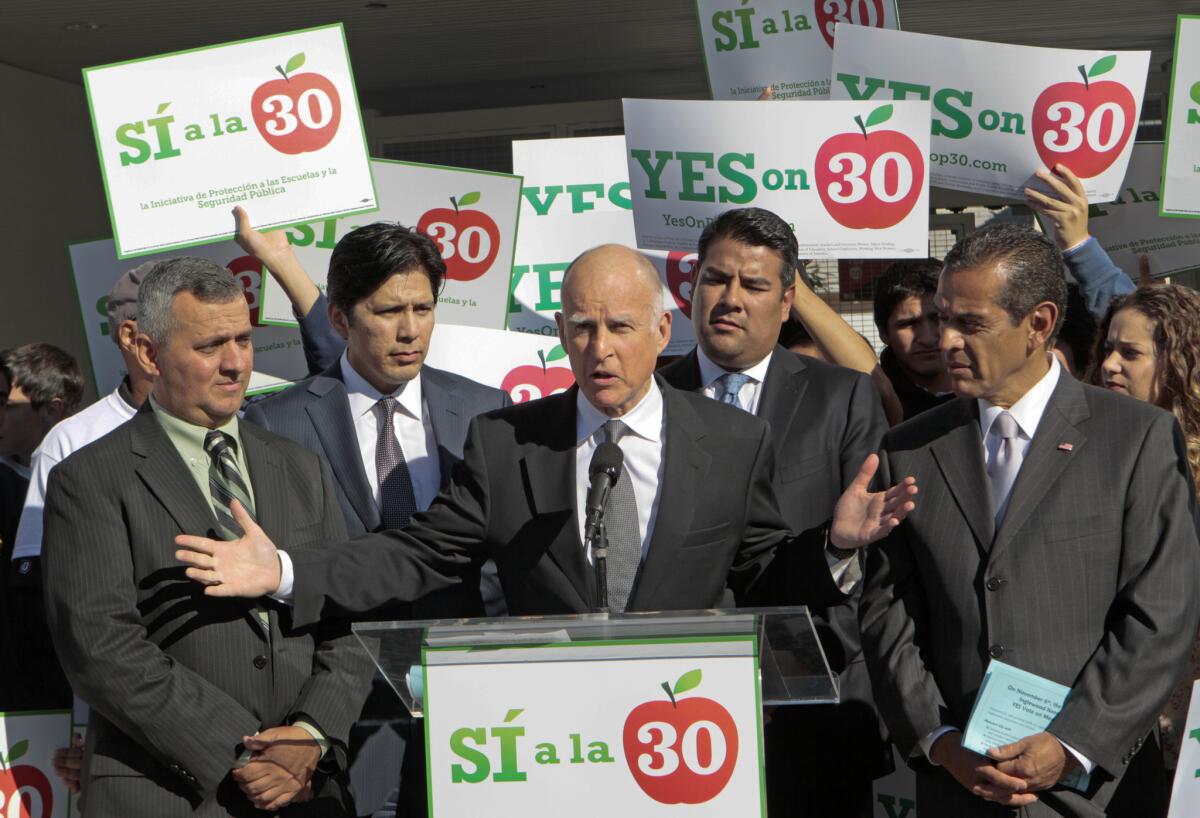Are higher taxes here to stay? Activists push for Prop. 30 extensions

Gov. Jerry Brown campaigning to temporarily raise taxes in 2012. Although he’s said the higher taxes should be allowed to expire, activist groups are pushing two different measures to extend them.
Reporting from Sacramento — Gov. Jerry Brown may have expressed reservations about continuing the temporary tax hikes he championed three years ago, but activist groups are pushing forward anyway.
Two campaigns are circulating initiatives to extend some parts of Proposition 30, with the goal of collecting enough signatures to place their proposals on the November 2016 ballot.
One of them, which filed its initiative on Monday, is even using the same political firm, SCN Strategies, that helped elect Brown and convince voters to pass his tax-hike plan in 2012.
Called the “Invest in California’s Children Act,” it would make permanent the higher income taxes set by Proposition 30, which are currently scheduled to expire at the end of 2018. (The quarter-cent sales tax hike would be allowed the lapse.) The proposal would also set higher levies for households earning more than $2 million a year.
Revenue from the taxes is estimated at $10 billion per year, with 45% for K-12 schools, 5% for community colleges, 10% for early childhood programs and 40% for Medi-Cal. It would also ensure some money was deposited in a reserve fund specifically for funding child services, a step intended to shield the programs from cuts during an economic recession.
SIGN UP for the free Essential Politics newsletter >>
Asked if the campaign has received or asked for Brown’s support, spokesman Dan Newman said, “We’re reaching out to all the stakeholders.”
The initiative is backed by the California Hospital Assn. and a chapter of the Service Employees International Union representing healthcare workers.
They’re not the only powerful interest groups seeking to preserve Proposition 30 revenue. Last week another initiative, the School Funding and Budget Stability Act, was filed by the California Teachers Assn. and the statewide Service Employees International Union.
Instead of making the income tax hike permanent, it would extend them until 2030. All of the money, up to an estimated $9 billion per year, would be sent to schools and community colleges. There would be no additional tax on households earning more than $2 million annually.
The governor’s office declined to comment Monday. Brown has previously pledged that he would not try to extend the Proposition 30 increases, calling them a temporary fix to the state’s budget deficits.
Nancy McFadden, a top advisor to the governor, said last year that Brown is “not going to break faith with the voters on that.”
Follow @chrismegerian for more updates from Sacramento.
ALSO:
California Republicans confront long odds in race to fill Sen. Barbara Boxer’s seat
Statewide tax credits for seismic retrofitting face a hurdle on Gov. Brown’s desk
California voters sharply disagree on low-cost healthcare for immigrants
More to Read
Sign up for Essential California
The most important California stories and recommendations in your inbox every morning.
You may occasionally receive promotional content from the Los Angeles Times.











